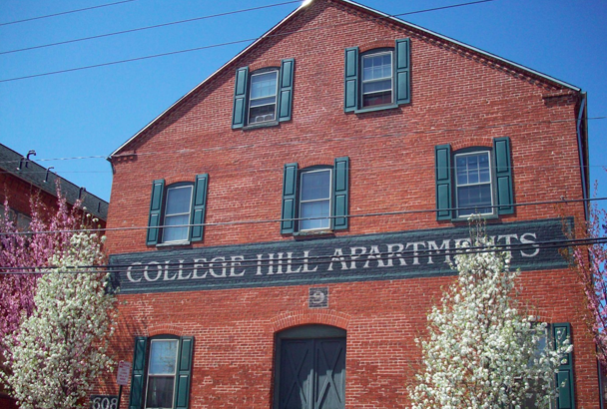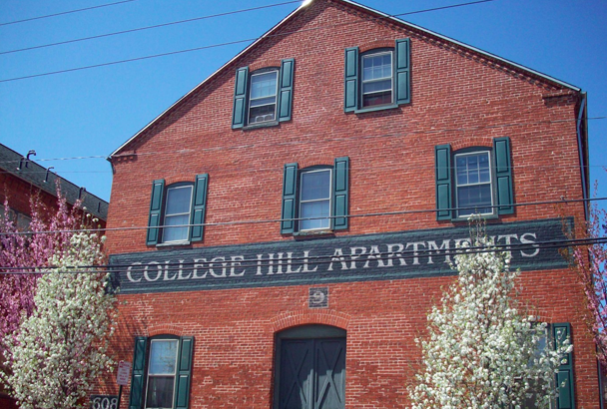By Daniel Robillard || Investigative Reporter
Several weeks before Franklin & Marshall College announced its decision to move online for the entirety of the spring 2020 semester, hundreds of students had already signed binding leases for off-campus apartments for the upcoming year.
With around 30% of all F&M students living in off-campus housing this fall, a student pledge that provides little guidance for those properties, and an already rocky start to testing and quarantine plans, off-campus housing could potentially become a risk that at the least severely complicates F&M’s attempt to safely return to an in-person semester this fall. It could also derail the College’s semester entirely, not only forcing a return to entirely online learning but also posing a threat to the Lancaster community that F&M is so closely connected to.
The entry testing for the several hundred students now living in off-campus housing has proved to be a debacle, with potentially damaging effects. While there has been a significant amount of emphasis placed on quarantining in on-campus residences, enforcement or monitoring of quarantining after testing in off-campus housing has been entirely absent. Students living off-campus received entry tests, after which they were simply asked to quarantine in their apartments after being tested.
“I think that asking students to quarantine and just trusting them is not a very practical idea” said Rasheed Adewole ’21, a senior living in an off-campus apartment in College Row.
Unlike in on-campus housing, there was no coordinated effort by the College to test students living together in off-campus buildings all at once, meaning many students in the same buildings often had several days or even weeks differences in when they were tested and asked to quarantine.
Elena Robustelli ’21, a senior living off-campus, noted that while the College told students to quarantine after being tested, “with everyone coming to Lancaster at different times, it’s impossible to surveil who’s actually abiding by the quarantine or not.”
With the likelihood that friends—and even roommates—living next-door could be out of quarantine, many students living off-campus were certainly provided plenty of incentives to skip out on the unmonitored and unenforced quarantine phase after their initial tests. “What underpins the reason why most students are back on campus this fall is the fear that you’re missing out, and wanting to be around friends,” said Adewole. “So, being off-campus, getting tested, and then quarantining after that is certainly not a plan that the College should assume will actually work.”
In addition to the complete lack of quarantine monitoring, some students in off-campus housing were not able to get tested properly. Those who had already moved into their off-campus apartments early and received some of the first few days of tests were then unable to receive their second entry test within seven days of their first because all of the College’s testing resources were reserved for the hundreds of other students arriving on campus. This meant that some off-campus students didn’t receive a second entry test until nearly two weeks after their initial test, completely negating a testing plan that aims to decrease the likelihood of a false negative by testing students twice in a short window of time (when the virus has a chance to build up in the body).

Some students who moved into their off-campus apartments over the past two weeks were unable to schedule tests on the day of their arrival, sometimes not being able to be tested until several days after moving-in. Students who raised this issue with the Office of Student Affairs were simply told to “try and limit your exposure to other students,” according to email messages shared with The College Reporter.
In a video call on Monday, President Barbara Altmann acknowledged that some students living off-campus could potentially not be tested until a few days after the one-week window from their initial test, but said that according to the Student Wellness Center’s Managing Physician, Dr. Amy A. Myers, F&M had “hit all of our necessary parameters.”
Administration’s plans to prevent a potential outbreak on campus this fall also faces a harsh reality when it comes to students off-campus. What students do off-campus is often entirely uncontrollable by the College, adding a significant shortcoming to F&M’s attempts to best mitigate a potential outbreak on campus.The College has had virtually no control over the move-in process for off-campus housing, with many students already living in their apartments since the beginning of the summer and others still moving in just days before the start of classes. The housing arrangement limited the College’s options for considering a de-densification of campus, with hundreds of juniors and seniors already in binding leases well before the start of the coronavirus pandemic. The limitations created by F&M’s off-campus housing situation were also likely a key factor in the College’s abrupt decision to not allow sophomores to return to campus in the fall.
Many students who stayed in off-campus apartments during the summer had initially planned on participating in paid research programs with faculty on campus. After those programs were canceled due to the coronavirus pandemic, many of those students found jobs in places like restaurants off-campus—providing part-time incomes many say they will continue to need during the semester, particularly in-light of difficult economic situations precipitated by a global pandemic. Some of these students share a worry that their off-campus job puts them at greater risk of catching and possibly spreading COVID-19 on campus.
“While I know it’s not practical to test every student often, I particularly run a risk of catching COVID in the middle of the semester because of my off-campus job” said Chloe Holod ’22, a junior chemistry major who began working at a busy restaurant near campus this summer. “I personally protect myself well, but it is naive to think that no students are at risk from their jobs during the semester,” Holod said from her off-campus apartment in College Row.
The social activities that students choose to do off-campus pose perhaps the greatest risk to the F&M’s hopes for an outbreak-free semester.
Over the past few months, countless public health experts have warned that bars are fueling COVID-19 outbreaks across the country, especially among young adults. In July, the Secretary of Health began alerting physicians across Pennsylvania of a surging number of cases among younger people connected to bars and other similar social settings. And just yesterday, the Pennsylvania Department of Health issued a press release highlighting the “significant increase in the number of COVID-19 cases among younger age groups, particularly 19 to 24-year-olds.”
These warnings come as several bars near F&M’s campus have already begun seeing an uptick in the past few days as students begin to increasingly move their social lives off-campus, beyond the watchful eyes of the College. Some schools in Pennsylvania, such as Bryn Mawr College, have included not allowing students to visit bars off-campus as part of their own student pledges because of the dangers that such risky behavior could pose.
“There was a conversation” (about policies restricting off-campus bars being included in the F&M Pledge), “but with Pennsylvania guidelines that mandate food be served with alcohol, it was less of a concern” DipCon President Shubh Punj ’21 told The College Reporter. “I think random testing will be a big part of tracking our health as a campus,” Punj said, referring to the College’s plans to randomly test some students every two weeks, “but off-campus activities are definitely going to be challenging.”
President Altmann also noted the particular challenges off-campus poses, framing a return to an in-person fall semester as “a calculated risk.” Attempting to create a bubble on campus “would be a fool’s errand” Altmann said on Monday. “We cannot create a bubble, as we have a high percentage of students in off-campus housing who have significantly greater autonomy—as is the point with such housing.”
Altmann continued to emphasize the F&M Pledge as the primary mechanism that will help ensure students are preventing an outbreak this fall, even as they venture off of campus. “We don’t want to limit students’ ability to access and enjoy the City,” she said. “For off-campus activities, we need to rely on the pledge, which students are still liable to follow, even when they are off-campus.”
It remains unclear as to how the College intends to deal with potentially risky gatherings on its off-campus housing properties. Although College officials frequently emphasize that leases for off-campus apartments are with third parties, in most instances, those third parties are inextricably tied to the school. However, the F&M Pledge, which has been signed by most but not all students that are returning to campus, does not offer much guidance when it comes to off-campus housing. Speaking to The College Reporter on Tuesday, Punj said that while there are some references to capacity limits in the Pledge, “for off-campus, there is definitely a lack of clarity.”
Junior Daniel Robillard is an investigative reporter. His email is drobilla@fandm.edu.
